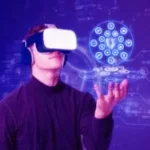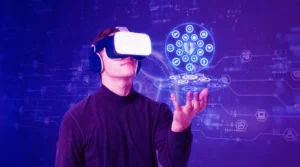ArdorComm Media Bureau
April 23, 2022
The much-anticipated next generation of the Internet, the metaverse, is the latest buzzword in the IT world. It’s a combination of virtual reality (VR), augmented reality (AR), online gaming, social media, and cryptocurrency that promises to deliver an interconnected virtual experience that re-imagines how we engage online in the future.
Immersive technology has advanced significantly in recent years. VR environments are becoming more feature-rich, while emerging AR and holographic technologies are seamlessly blending the digital and physical worlds. These technologies are being used by an increasing number of companies, and they will continue to gain traction across industry verticals and around the world.
Booming of New Technology
The term “metaverse” refers to a virtual environment enhanced by upcoming immersive technologies such as extended reality (a mix of VR, AR, and MR), non-fungible tokens (NFTs), cryptocurrencies, artificial intelligence (AI), Internet of Things (IoT), and more. It isn’t, however, a brand-new concept. Immersive technologies had already been developed, but their use was limited to internet-based video games and social media in order to improve the quality and immersion of virtual reality environments. The work culture has shifted dramatically in the last two years, with remote and hybrid workspaces becoming the new standard. Metaverse technologies will be used to improve job productivity, provide interactive learning environments, and facilitate virtual reality home tours, among other things. Many businesses are already developing best-in-class Proofs-of-Concept and top-notch development abilities.
The Future of Work and the Metaverse
The internet and other work-from-home technology helped us stay resilient and preserved business continuity as the COVID-19 pandemic swept industries and devastated economies. Many businesses, such as education, retail, conferencing, and event management, have become technologically intensive. While social separation was in effect, the most evident and fundamental shift that the world witnessed was how people communicated. Physical meetings, conferences, and events came to a halt, with the majority of individuals opting for online video conferencing systems.
One of the growing issues in the remote and hybrid work environment is keeping employees interested on online video conferencing platforms for lengthy periods of time. Keeping a large group of people fascinated and engaged on small displays when on virtual calls becomes a difficult task. However, not everyone enjoys appearing on camera.
It’s tough to grasp the extent to which each virtual call participant is involved. In addition, practically everyone who used virtual tools during this era will agree that their online meeting times overlapped on certain days or that they did not have enough time to finish the chat. People also complained about screen fatigue and other ailments as a result of spending long periods of time online. These are some of the reasons why businesses are interested in metaverse-based solutions. But how is it different in the metaverse, you might wonder?
Work in an Immersive Setting
In a world of virtual work, the metaverse promises to deliver new degrees of social interaction, mobility, and collaboration. Metaverse will further revolutionise these industries by introducing virtual reality (VR) wearables that allow people to explore and purchase services through immersive visualisation (without leaving the premise of their homes). Furthermore, computer-generated holography technology is progressing quickly and will soon replace the need for VR headsets, either through the use of virtual viewing windows that create holographic displays from computer images or through the deployment of specially designed holographic pods that project people and images into actual space at events or meetings. Meta is developing haptic (touch) gloves that allow users to interact with 3-D virtual objects and feel sensations such as movement, texture, and pressure. Meta has been in the news for their comprehensive metaverse-centric business ambitions.
Technology is removing certain traditional features of the workplace, such as team cooperation, learning and development, and company culture, resulting in the formation of new working patterns.


